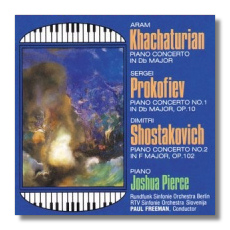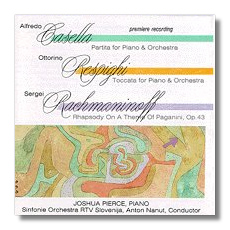
The Internet's Premier Classical Music Source
Related Links
- Latest Reviews
- More Reviews
-
By Composer
-
Collections
DVD & Blu-ray
Books
Concert Reviews
Articles/Interviews
Software
Audio
Search Amazon
Recommended Links
Site News
 CD Review
CD Review
Joshua Pierce

Plays 20th-century Works for Piano & Orchestra
- Aram Khachaturian: Piano Concerto in D Flat Major *
- Serge Prokofieff: Piano Concerto #1 in D Flat Major, Op. 10
- Dmitri Shostakovich: Piano Concerto #2 in F Major, Op. 102
Joshua Pierce, piano
* Berlin Radio Symphony Orchestra/Paul Freeman
RTV Sinfonie Orchestra/Paul Freeman
Phoenix PHCD117 DDD


- Ottorino Respighi: Toccata for Piano and Orchestra (1928)
- Sergei Rachmaninoff: Rhapsody on a Theme of Paganini, Op. 43
- Alfredo Casella: Partita for Piano and Orchestra (1924-25)
Joshua Pierce, piano
Sinfonie Orchestra Radio & Television, Slovenija/Anton Nanut
Phoenix PHCD124 DDD
Whatever you might say about Joshua Pierce, he certainly isn't a boring or unimaginative pianist. He goes his own interpretative way and possesses an arsenal of pianistic talents that can both astonish the ear and instruct the mind.
His Khachaturian is muscular and colorful, driven and powerful. On the surface, then, we at least have a thrilling performance of a concerto that doesn't rest well in contemplative hands. Yet, his reading may be too much of a good thing: his tone is rich but his dynamics often tilt too heavily toward the voluminous side; and his accents are often peculiar (hear, for instance, how he phrases the latter part of the second movement's main theme, around 1:27). On the plus side, he plays the cadenzas with imagination and deft attention to crucial detail. Try the one in the finale – Pierce renders it with tremendous atmosphere and individuality. I'm not sure anyone has ever played it better. On the whole the orchestra responds decently under the baton of veteran conductor Paul Freeman, but in places sounds undistinguished, as in the reed work just after 9:00 in the first movement. Still, this is a generally convincing account in a crowded field. The Jemelik/Klima (originally released on a Parliament LP circa 1960), issued a few years ago on (I believe) Urania and the Yablonskaya/Yablonsky on Naxos are preferable contenders, though the couplings here make this Phoenix version awfully attractive. Sound is good, though focused a bit too much on the piano.
Speaking of the couplings, the Prokofieff First is played with the same individuality and skill. Here, however, Pierce's reading may be a little less successful. His phrasing of the colorful, rather giddy theme in the opening of the finale, for example, doesn't sound playful enough, with base notes given a bit too much prominence. And while his playing rarely shortchanges the more caustic elements in this score, Pierce gives us a Prokofieff with power and muscle, all right, but lacking in the whimsical and sardonic. Far from a bad performance, this one nevertheless cannot challenge such stalwarts as Szell/Graffman (Sony), Ashkenazy/Previn (London), Berman/Järvi (Chandos), and Beroff/Masur (EMI). The Slovenian Orchestra plays well enough and Freeman abets Pierce with a knowing baton. The sound is again weighted toward the piano, though more than acceptable.
The Shostakovich fares better, even though it, too, is powerful and very muscular, possessing traits in general that might seem at odds with the simple and youthful-sounding character of the work. Pierce, however, makes an excellent case for his approach, supplying a liveliness and jeu d'esprit to contrast with the potent outbursts, as in the first movement's development. I almost wish he had phrased the second movement's main theme with more delicacy and a bit less throttle, but then, let's fact it, this music isn't meant to be subtle or deep. The finale is stunningly rendered, capping a performance that rivals my previous favorite, the Bernstein/NY Phil. This is the best playing on the disc. Freeman and his forces come through splendidly. Sound is good, with the piano again a bit too forward for my tastes. The copious notes on all works by veteran musicologist Eric Salzman are informative and enlightening. If these three popular works appeal to you, you won't be shortchanged by purchase of this CD.
I suspect the second disc in the headnote above will sell a lot fewer copies than the first, owing to the lesser prominence of two of the names on the marquee. That's unfortunate because the music is quite worthwhile. Phoenix claims the Casella to be a world première recording and the Respighi a CD first. Their statements may be accurate, but I usually shy away from verifying such claims, leery there may be (or have been) a foreign or little-known issue lurking in some record bin. In any event, both works are decidedly obscure and certainly new to me – and, believe me, I've heard my share of off-the-beaten-path works.
The Respighi sounds like Liszt under the spell of Bach, and while some may think that a handicap – after all, isn't originality what art is all about? – the piece has strong appeal, nevertheless. Respighi was known to write in different styles, sometimes appropriating stylistic elements from composers of the past – and, you might say, in an original way. That's quite the case here, and if the piece seems to ramble at times, it's still worth the price of admission – from the dramatic opening on to the lovely Italianate theme (Andante lento) that seems struggling to embrace its Baroque roots one moment, then to shirk them the next, and finally on to the colorful toccata proper, the work by turns fascinates and lulls, scintillates and excites; and if you're not quite convinced it's a masterpiece, you're nevertheless puzzled by its general neglect.
The Partita of Alfredo Casella (1883-1947) invokes the neo-classicism of Stravinsky, especially in its vigorous, rambunctious first movement, Sinfonia. The ensuing Passacaglia veers away from that influence and displays a greater expressive range and even profound aspects in its brooding theme and in some of the variants. Here, unlike the mood of the opening movement, there is only a hint of the Italian air hovering above the proceedings, wintry and northerly at that. The finale is bombastic at the outset, then turns subtle and delicate in places, Stravinsky lurking about again. The brass outbursts and some of the reed writing, in fact, remind one of the Concerto for Piano and Winds, a new work at the time of the Partita's composition. Still, Casella manages to speak in his own voice here, resounding a music of optimism and character, of drive and a sense of climactic power as the ending nears. I would say this piece is better than the Respighi. Pierce seems at one with the spirit of these works, capturing their multi-faceted personae with deft, sensitive pianism that probably few rivals could muster. Venturing onto this musical highway, with no traffic to follow, but relying only on your own instincts to negotiate the sharp curves and steep hills, is a challenge most artists would choose to avoid. The underrated Anton Nanut splendidly partners Pierce, drawing excellent performances from his able Slovenian players. Good sound.
Pierce's Rachmaninoff Rhapsody is one of the fastest performances I've ever heard. In fact, I don't believe I have a brisker one in my collection – or one even close. Normally, you would become suspicious of such a seemingly extreme timing, but in this case Pierce is fully convincing, delivering a Rachmaninoff that is by turns romantic and brilliant, demonic and urgent, but never radical or excessive. His playing of the dies irae theme is stately and deliciously serene, then appropriately becomes menacing and downright scary. Nanut is right on target here – and throughout, for that matter – supplying all the dramatic and ominous atmosphere you'd want. But for the somewhat brusque and brisk 18th variation, this account might rank at or near the top of the considerable heap. Still, it's a performance not to be dismissed. I've developed a liking for the recent Volkov/Tchistiakov on Brioso and for the older Ousset/Rattle on EMI. Phoenix offers excellent notes and sound. This CD contains a trio of worthwhile pieces that early 20th-century fanciers will want to obtain. Highly recommended. One note of caution – I had trouble tracking these two CDs on two of my players, though my better one negotiated them with no trouble. The problem was most probably due to a slight misalignment in the CD players, so if yours is properly aligned or new, you should have no difficulty.
Copyright © 1998, Robert Cummings


















